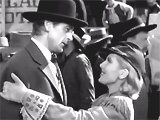
|
The Plainsman (1936)
In Cecil B. DeMille's epic western about the post-Civil
War period, the film portrayed historical
characters and events (the life of Wild Bill Hickok and other plainsmen,
and also other famous personages such as Abraham Lincoln and General
Custer), although compressed into one timeline:
- the opening title card: "Among the men who
thrust forward America's frontier were Wild Bill Hickok and Buffalo
Bill Cody. The story that follows compresses many years, many lives,
and widely separated events into one narrative -- in an attempt
to do justice to the courage of the plainsman of the West"
- the film's title-card epilogue: "It shall be as it was
in the past... Not with dreams, but with strength and with courage...
Shall a nation be molded to last."
- in the opening scene (in the post-Civil War period)
as he was scolded by wife Mary (Leila McIntyre) for being late
to the theater, President Abraham Lincoln (Frank McGlynn, Sr.)
was exultant that the Civil War was over, and explained how he
hoped that settlers and war veterans could now be attracted to
and move into the Western frontier that would be protected and
safe for settlement and the plow: ("I
hope to attract our disbanded soldiers to the hidden wealth of
our mountain ranges and to the wealth that lies in the soil itself...");
he fatefully left that evening to attend Ford's Theater, where
he was assassinated

Wild Bill Hickok (Gary Cooper)
|

Buffalo Bill Cody (James Ellison)
|

Calamity Jane (Jane Arthur)
|
- a friendship developed between
Indian scout Buffalo Bill Cody (James Ellison) with his domesticating
new Eastern wife Louisa (Helen Burgess), and Wild Bill Hickok (Gary
Cooper) and his romantic interest - bull-whip snapping stagecoach
driver Calamity Jane (Jane Arthur); when she greeted Hickok
in Leavenworth, Kansas, Jane called out: "You mangy
old coyote!"; she kissed him, and then noted: "Aw, you four-flushin' mule.
You ain't wipin' it off. You're rubbin' it in"; when she asked
why he didn't write her letters, he accused her of being promiscuous: "A
woman who has a fella at every stage station, and a beau in every
cavalry troop west of the Missouri - that woman doesn't need any
letters from me"
- Wild Bill quickly warned Louisa as she boarded Calamity's
stagecoach ("prairie clipper")
on the way to Hays City, KS - that there was lawlessness on the
frontier: "There's no Sunday west of Junction City, no law west of Hays City and no
God west of Carson City"
- the villain of the film was profiteer, unscrupulous,
gun-running John Lattimer (Charles Bickford), who was shipping large
wooden crates marked as farming tools from St. Louis to the newly-settled
West; the crates actually held seven-shot repeating
rifles that would be sold to the Cheyenne
Indians, led by Chief Yellow Hand (Paul Harvey), who used them against
US cavalry troops; there would be dire consequences, including
threats to Lincoln's dream of a safe country
- Buffalo Bill was commissioned by General Custer
(John Miljan) to lead troops to fend off the increasing number of
Cheyenne Indian attacks on frontier settlements and wagon trains;
Cody was assigned as a guide for an ammunition train bound for Fort
Piney
- meanwhile, Wild Bill Hickok attempted to locate Chief
Yellow Hand to speak to him about the increase in Indian attacks,
when both Jane and Wild Bill Hickok were abducted and captured (Hickok unsuccessfully
tried to negotiate for Jane's release)
- the two were taken to
the Cheyenne camp where Hickok spoke to Chief Yellow Hand and learned
why the Indian chief and all the tribes were on the "warpath" -
they were opposing the unlawful taking of Indian lands and slaughter
of their main food source - buffalo: ("Where sun rise,
white man's land. Where sun set, Indian land. White man come, take
our land. Kill buffalo, our food. White man promise us food. White
man lie. Now Cheyenne buy white man's thunder stick. Soon war drums
sound in all Indian land. All tribes ride with Yellow Hand. We drive
white man, like buffalo, away, back to rising sun. Yellow Hand has
spoken")

Captured Hickok with Chief Yellow Hand
|

One of Lattimer's Crates of Rifles, Sold to the
Cheyenne
|

To Save Hickok, Jane Was Forced to Reveal the Location
of a Reinforcement Supply Train
|
- while captured, Jane (who was lovesick about Hickok)
was forced to tell the Indians the direction, route and location
("deep Valley through the upper ford") of the mule-led supply train
(with 10,000 rounds of ammunition as reinforcements) bound for
Fort Piney, to save him from being burned alive (over a fire pit);
her major betrayal and confession would mean the sacrifice of some
of Buffalo Bill Cody's 48 troops who were riding as guides and
protectors for the supply train
- the wagon train was ambushed by
the Cheyenne using Lattimer's purchased "thundersticks" (rifles);
the supply train suffered a six-day long siege and was ultimately
saved by the arrival of Gen. Custer's forces - it was one of
the best action segments in the film
- seeking vengeance, Hickok subsequently pursued
after Lattimer's gang and Lattimer himself, and killed three of
Lattimer's gang members during an attempted ambush, although he
was wounded in the arm; then Hickok continued his personal chase
after Lattimer into the Black Hills (Dakota Territory); in
Deadwood, Hickok defended himself with his two-gun
killing of John Lattimer and one of his men
- news arrived that Gen. George A. Custer's forces
had been massacred at the Battle of the Little Big Horn (recreated
while described and recalled by a young Cheyenne Indian (Anthony
Quinn, director DeMille's future son-in-law))
- a memorable barroom death scene
followed in the Bella Union saloon in Deadwood, Dakota Territory
(in 1876); Wild Bill Hickok was playing poker (with a famous 'dead
man's hand' of black aces and eights, losing to three queens) against
some of Lattimer's cohorts as he was awaiting the arrival of military
authorities to take them away; at the end of his losing game when
he mentioned casually: "A man's bound to lose, sooner or later," Wild Bill was fatally
shot in the back by cowardly Lattimer supporter Jack McCall (Porter
Hall); Wild Bill normally played with his back against a wall, but
this time had broken his own rule
|
Death of Hickok While Playing Poker, in Calamity's
Arms
|

|

|

|

|
- as the film ended, Wild Bill was cradled on the
saloon floor by a heartbroken and teary-eyed Calamity Jane (who
had followed him to Deadwood); Cody arrived and said he would always
remember Bill's legacy: ("All of us will. All of us"); Calamity kissed Bill's cold lips
and told him: "That's one kiss you won't wipe off"
- the film's epilogue: "It shall be as it was in the
past... Not with dreams, but with strength and with courage...
Shall a nation be molded to last"
|


Bookend Title Cards

Opening: Abraham Lincoln (Frank McGlynn, Sr.) with His
Wife Mary (Leila McIntyre)

Gun-Selling War Profiteer John Lattimer (Charles Bickford)

Calamity to Hickok About Her Kiss: "You ain't wipin'
it off. You're rubbin' it in"

Wild Bill's Warning to Cody's Wife Louisa
About Lawlessness on the Frontier

Gen. George A. Custer (John Miljan)

Both Hickok and Jane Were Captured by Cheyenne

Hickok Was Threatened to be Burned Alive

Indians on Warpath - Ambushing the Supply
Train

Death of Gen. Custer at Custer's Last Stand


Hickok Confronting and Killing Lattimer
|














